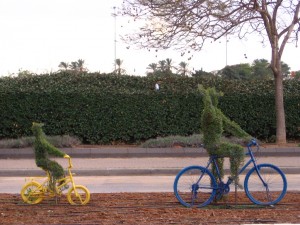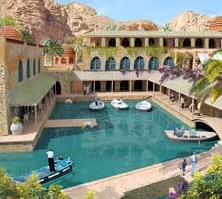 Plastic bags are evil. They are not biodegradable, pollute our landfills, pollute our waterways, convince fish and ducks that they’re food… it’s pretty well established that they’re just bad news. While activists encourage consumers to try using fewer bags, or sometimes try to ban the use of plastic bags entirely, the truth is that these pleas often fall on deaf ears.
Plastic bags are evil. They are not biodegradable, pollute our landfills, pollute our waterways, convince fish and ducks that they’re food… it’s pretty well established that they’re just bad news. While activists encourage consumers to try using fewer bags, or sometimes try to ban the use of plastic bags entirely, the truth is that these pleas often fall on deaf ears.
Which is where – thankfully – designers step in. Because where environmental activists fail, hip design often succeeds.
Waste Lb, the collaboration of designers Waleed Jad and Stephanie Dadour, is a response to the pervasive use of plastic shopping bags in Lebanon. Waste Lb reclaims flex, the material used to create billboards, in order to make reusable shopping bags such as the ones above and below. (Abu Yoyo, a designer based in Tel Aviv, also appropriates billboard materials in order to make bags.)
By using flex, Waste Lb encourages conservation in two ways: they encourage consumers to switch to reusable bags while simultaneously using material that would otherwise be discarded into a landfill. According to Dadour, “we know we’re not here to change the world or to educate people, but we thought we could sensitize people to reduce their use of plastic bags by promoting a product that can be reused.”
 In addition to conserving material and saving landfill space, the use of flex has a distinct design function as well. It means that no two bags are alike, which appeals to the fashion conscious. The fashion conscious will also be happy to know that Waste Lb’s bags come in a few styles – oversized grocery bags, clutch bags for women, and beach bags. Jad and Dadour hope to someday expand into the realms of flex furniture as well.
In addition to conserving material and saving landfill space, the use of flex has a distinct design function as well. It means that no two bags are alike, which appeals to the fashion conscious. The fashion conscious will also be happy to know that Waste Lb’s bags come in a few styles – oversized grocery bags, clutch bags for women, and beach bags. Jad and Dadour hope to someday expand into the realms of flex furniture as well.
Waste Lb’s message of conservation is made more universal by the fact that their flex bags are wallet-friendly. Their signature oversized shopping bag (the Kees Dukanne) has a fixed price of LL25,000.
According to its website, Waste Lb’s mission is “to provide consumers with a range of practical products enabling people to reduce, reuse and save.”
Waste Lb will be launching their flex bag collection this coming Saturday, June 27th at Souk El Tayeb in Beirut from 9am to 2pm.
Read more about sustainable designers:
Merav Feiglin’s recycled lights out of trash
Waste Not, Want Not: Doron Sar-Shalom Recycles With Style
Beggars Can Be Choosers: Amit Brilliant’s Recycled Wallets
Beauty Increases Sustainability, According to Designer Gadi Amit
Ten Sustainable Israeli Designers Who Reduce, Reuse & Recycle
Abu Yoyo: Piggybacking On Tel Aviv’s Billboard Waste
Recycling Plastic Bags Into … Beautiful Handbags
Bag It Up: Inbal Limor Recycles Plastic Bags Into High Art



I am a big advocate of limiting plastic bag use because they are overused, difficult to dispose of, and have a whole host of negative environmental impacts.
It really blows my mind sometimes, as to how much we use plastic bags. The other day I was in an organic food store and I only bought a small bag of pasta. After I paid, the cashier tried to put the small bag into a plastic bag, and that was at an “environmentally friendly” store!!
Stores are often so eager to put things in plastic, and they look at you like you’re crazy when you go out of your way to tell them that its okay and you don’t need a plastic bag.
Sometimes I leave Shuk Ha Carmel with an assortment of plastic bags inside within my bigger reusable bag, and I am conscious of this sort of thing and really try to limit bag use, so I think about how many bags someone who is not conscious of this would have.
While I think that promoting the use of reusable bags is a great, often times it is just difficult to avoid plastic, like for weighing fruits and vegetables, and when the cashier throws all of your items into a bag before you can even stop them, or when you simply didn’t intend to buy food and don’t have a bag with you.
Disposable bags should definitely be lessened, but lately I have been looking at types of disposable bags that are biodegradable and made from organic materials that are less energy intensive to produce and easier to dispose of safely.
Purefresh Organic, and Planet Organic are a few names that are using and producing new forms of disposable bags that are organically made and biodegrade faster and more harmlessly than plastic.
Similarly with water bottles, sometimes as painful as it is, a disposable plastic water bottle may be the only option and hopefully water bottles can also start to be made with organic materials.